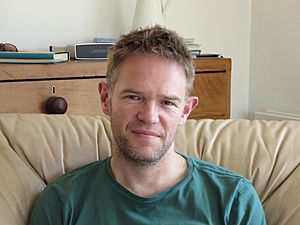Richard Thomas (mathematician) facts for kids
Quick facts for kids
Richard Thomas
|
|
|---|---|
 |
|
| Born |
Richard Paul Winsley Thomas
|
| Alma mater | University of Oxford |
| Known for |
|
| Awards | Whitehead Prize (2004) Veblen Prize (2025) |
| Scientific career | |
| Fields | Mathematics |
| Institutions | Imperial College London |
| Thesis | Gauge Theory on Calabi-Yau Manifolds (1997) |
| Doctoral advisor | Simon Donaldson |
Richard Paul Winsley Thomas is a British mathematician. He works on different types of geometry. He is a professor at Imperial College London.
Professor Thomas studies special math problems. These include how shapes can change in algebraic geometry. He also explores 'mirror symmetry'. This is a fascinating idea in pure mathematics. It was first suggested by string theory in theoretical physics.
Contents
His Journey in Math
Richard Thomas earned his PhD in 1997. He studied a topic called gauge theory on Calabi–Yau manifolds. His teacher was Simon Donaldson at the University of Oxford.
For his PhD, he helped create something called Donaldson–Thomas invariants. These are important numbers for special shapes called Calabi-Yau 3-folds. This work is a big part of geometry and the math behind string theory.
Career and Research
Before joining Imperial College, Professor Thomas worked at other famous places. These included the Institute for Advanced Study in Princeton, New Jersey. He also spent time at Harvard University and the University of Oxford. He became a professor of pure mathematics in 2005.
Contributions to Geometry
Professor Thomas has made many important discoveries. His work covers different areas of geometry. These include algebraic geometry, differential geometry, and symplectic geometry.
His PhD work introduced the Donaldson–Thomas invariants. He also worked with Paul Seidel on how shapes can change. With Shing-Tung Yau, he proposed the Thomas–Yau conjecture. This idea is about finding special shapes within other shapes.
He also worked with Rahul Pandharipande. Together, they improved the Donaldson–Thomas invariants for counting curves. With Martijn Kool and Vivek Shende, he used these ideas to solve the Göttsche conjecture. This was a very old problem in algebraic geometry.
Professor Thomas also helped prove the Katz–Klemm–Vafa (KKV) conjecture. This showed links between different math theories. He also worked with Daniel Huybrechts on how complex shapes can change.
Sharing Knowledge
Richard Thomas also wrote a book about mirror symmetry. He has written notes to explain complex math topics. These include derived categories and curve counting. He even appeared in a documentary film called 'Thinking space'.
He has played a big role in growing geometry studies in the UK. He encourages younger mathematicians. He also helped make Imperial College a major center for geometry research. His former teacher, Simon Donaldson, said that thanks to Richard Thomas, Imperial College now has one of the main centers for geometry research.
Awards and Honors
Professor Thomas has received many awards for his work.
- In 2004, he won the London Mathematical Society's Whitehead Prize. He also received the Philip Leverhulme Prize.
- In 2010, he was given the Royal Society Wolfson Research Merit Award.
- The Whitehead Prize praised his wide range of contributions. It noted his deep insights and complex proofs. His work on mirror symmetry is especially important.
In 2010, he was also invited to speak at a big math conference. This was the International Congress of Mathematicians in Hyderabad. He gave a lecture on mirror symmetry.
In 2015, he was elected a Fellow of the Royal Society (FRS). This is a very high honor for scientists in the UK.
In 2018, he became a fellow of the American Mathematical Society. This was for his important work in algebraic geometry.
Most recently, in 2025, he was awarded the Oswald Veblen Prize in Geometry. He shared this prize with Soheyla Feyzbakhsh.
 | Kyle Baker |
 | Joseph Yoakum |
 | Laura Wheeler Waring |
 | Henry Ossawa Tanner |

